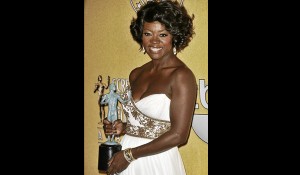LOS ANGELES—Meryl Streep and Viola Davis formed a deep bond when they appeared together in “Doubt.” When Meryl won over Viola in the recent Golden Globe Awards, the formidable actress gave a special shoutout to “The Help” actress: “I love you, Viola. You’re my girl!”
When it was Viola’s turn to triumph over Meryl in the SAG Awards, the latter was visibly happy for the former. Viola’s win made the coming Oscar Best Actress race more interesting.
In the following excerpts of our interview with Viola, she talked about how growing up as part of the only black family in Central Falls, Rhode Island, made her “The Help” role resonate with her.
This film is about finding your voice. Do you remember a moment when you were growing up and you found your voice or somebody helped you discover it?
I’m still trying to find my voice. There were moments when I found my voice when I was younger only because I was forced to. I grew up in Central Falls, Rhode Island. When I was in fifth grade, eight boys used to always chase me after school because we were the first black family in Central Falls. They would chase me with sticks and bricks. They wanted to beat me up.
I remember I was in science class one day. One of the boys in that group, the ringleader who hated me, whispered under his breath. He called me an ugly black “n” word. I remember that I stood up in the middle of the class and I said, “I’m going to kick your ass.” The teacher was totally shocked.
We had a whole conversation about race in the middle of science class. Of course, I got in trouble for saying “ass” in school. But I thought, sometimes you have to get mad and uncomfortable. I was 10 years old.
Can you share other moments when you stood up for what you believed in?
I had some acts of courage when I was at Juilliard. I’m committed to excellence when it comes to people of color. I feel that actors of color are sometimes more concerned with image and message than excellence. When I was at Juilliard, there were very few African-American students. I felt that a lot of the material they gave us was negating who we were. It was all about European classical training.
So I felt that I had to make the school join the 21st century in terms of understanding that there are artists and stories out there that go beyond the white experience in this country–that there are fantastic and valuable stories in other countries. I got tired of playing Blanche Dubois. Who wanted to see me play Blanche Dubois anyway? It was ridiculous.
What was in you that made you give such a good portrayal of Abileen Clark?
I think of myself as two things. First, I grew up in very challenging circumstances. I was an observer of people and human behavior. When you grow up in poverty, nobody around you pretends to be anything other than who they are. You know who everybody is so it was a ripe, fertile ground for an artist to observe.
Second, I went to a school for acting. I know how to craft a performance. That’s what you have to do as an actor—you have to create a human being—who she is, where she came from, what are her needs, objectives. From the moment I saw Cicely Tyson when I was 6 years old, I wanted to be a craftsperson like her. Like Meryl Streep, I wanted to transform. I didn’t want to just entertain. I wanted to be an artist.
How was the dynamic between you and the actresses whose characters were treating yours badly?
This was the happiest set you could possibly imagine. It was a love fest with everybody. That’s unusual with women from all generations and races. We just loved each other. It was very uncomfortable between scenes but that was a good thing. It was supposed to be uncomfortable.
For example, it was very uncomfortable in the tea party scenes. I had no words whatsoever. She was a very quiet character so I had to implode all the humiliation that was going around me, listening to them talk about me and pretending that I was invisible.
What dreams have you been able to realize and which ones are you still hoping to come true?
Being an actor who’s respected for her craft—that’s the one big dream I had, also, to give back to my community. I’ve been able to do that to a certain extent. I have an education program back home. But I feel that my bigger dream right now that I have yet to achieve is to be more involved in the producing medium. I want to get more imaginative stories out there for people of color, especially for African-American actresses. I am really committed to that.
E-mail rvnepales_5585@yahoo.com. Follow https://twitter.com/nepalesruben.
